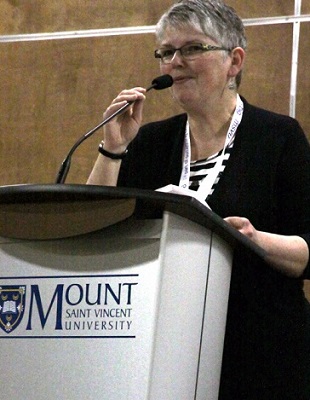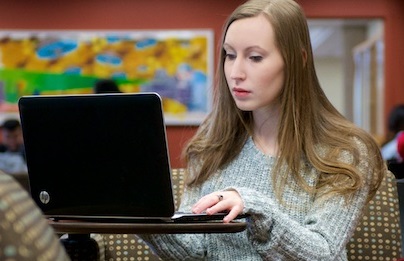Professor investigating means of taking lab work beyond campus, turning a home kitchen into a basic chemistry lab
Dr. Kathy Darvesh is a chemistry professor at the Mount with a unique approach to teaching, and her students are thriving because of it. She’s one of many teachers redefining the traditional classroom experience by creatively integrating technology into her lessons.
Multi-access learning
“You might call it multi-access learning,” says Dr. Darvesh. “Some students are physically in the classroom, but I also broadcast classes online and record them for later.” During class, Dr. Darvesh wears a microphone and carries around a tablet and stylus (the new-age version of a marker and whiteboard), enabling her to live-cast problem solving onto students’ screens.

“It’s amazingly well-received – and completely student driven.”
– Dr. Kathy Darvesh on her blended teaching approach.
Using the program Blackboard Collaborate, a common university-level online teaching program provided by the Mount, Dr. Darvesh interacts with students in-class and online simultaneously.
Dr. Darvesh also uses Moodle, another web-based classroom platform, to facilitate unique “virtual office hours”, where students can sign in at specified times and participate in live forum-style discussion with the professor. Each session is saved online for later viewing. “It enables me to answer more questions for more students. They can easily refer back to a previous discussion or question and all the information is right there,” says Dr. Darvesh.
Dr. Peggy Watts, Director of DLCE at the Mount (Distance Learning and Continuing Education) elaborates: “With Blackboard Collaborate, students can work together on common documents, participate in whole-group and break-out discussions, and record their sessions for review. The Mount has also been making Moodle sites available to every course for the past several years, extending the value of online communication to on-campus classes as well.”
Says Dr. Darvesh of her “blended” learning approach: “It’s amazingly well-received – and completely student driven. I’ve noticed an impact on student engagement in positive ways: you get a different group of students using the online tools and typing away their questions, in addition to those who raise their hands in class.”
From classroom to kitchen
Inspired by her experience with technology in the classroom, Dr. Darvesh is expanding on related ideas during her current sabbatical. She’s investigating the ways that preparatory chemistry courses could be taught via distance – turning a student’s home kitchen into a substitute lab. “With low-risk, household chemicals, we could be teaching students lab work from their own home. This would be a new, creative way to deliver basic level chemistry classes for students via distance.”
 Dr. Darvesh isn’t alone in her pursuits. She was originally inspired years ago by the ways colleagues at other universities were bringing technology into their teaching. “I just thought, if I could do it – why not?”
Dr. Darvesh isn’t alone in her pursuits. She was originally inspired years ago by the ways colleagues at other universities were bringing technology into their teaching. “I just thought, if I could do it – why not?”
Since then, she’s lectured at different chemistry education conferences about her experiences and helped professors with similar initiatives. She credits the support offered by the Mount’s Information Technology & Services department, DLCE, Digital Media Zone, and related departments. “There’s a community here that’s willing to support you all the way.”
Adding value to the learning experience
Peggy is part of that support team, helping the Mount community get the most out of technology resources on campus. “We are continually looking for ways to help teachers and learners feel more supported in the online environment,” she says.
Among those resources are an Instructional Developer who works with faculty members, technical and instructional development services, and the Digital Media Zone (DMZ), which is co-hosted by DLCE and IT&S departments. The DMZ offers unique resources like green screens, lighting, camera equipment, and sound recording equipment.
“Faculty and students can book the DMZ to create multi-media materials, video, podcasts, and more,” explains Peggy. Recently, one creative professor worked with the DMZ to record a ‘trailer’ for his introductory English course for example.
With supports like these Mount professors and students will continue to be at the cutting-edge in the creative application of technology in the pursuit of higher education.